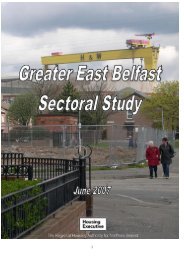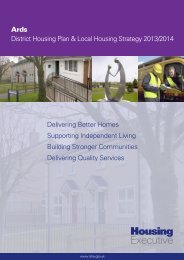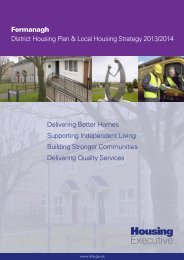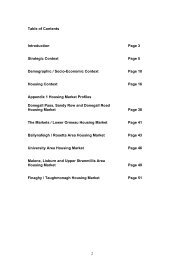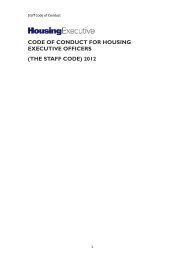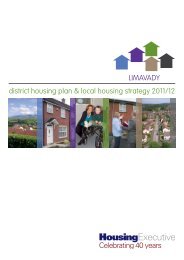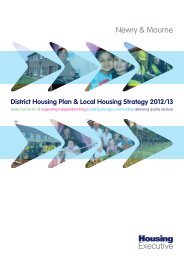The Housing Selection Scheme Consultation Paper - Northern ...
The Housing Selection Scheme Consultation Paper - Northern ...
The Housing Selection Scheme Consultation Paper - Northern ...
You also want an ePaper? Increase the reach of your titles
YUMPU automatically turns print PDFs into web optimized ePapers that Google loves.
Rural Proofing<br />
Rural proofing is a commitment by Government to ensure that policies take<br />
account of rural circumstances and needs. An initial screening of the proposed<br />
changes to the <strong>Housing</strong> <strong>Selection</strong> <strong>Scheme</strong> has been undertaken to consider rural<br />
issues. <strong>The</strong> following issues have been identified relevant to rural areas:<br />
1. It is probable that relocating households to smaller housing will be harder in<br />
rural areas because of the housing stock and the distances involved.<br />
Research undertaken by the University of Cambridge in England shows that<br />
under-occupation is more common in rural than in urban areas. Contributory<br />
factors include the lower level of smaller properties in rural areas and an older<br />
rural demographic. An examination of similar issues here is currently ongoing<br />
but indications are that a similar situation exists in <strong>Northern</strong> Ireland.<br />
2. While infrastructure varies in rural areas it is generally weaker, in terms of<br />
both information technology and physical networks. This could create<br />
particular issues in ensuring that information on the proposed amendments is<br />
accessible for rural dwellers.<br />
In relation to 1, the proposed changes are primarily designed to address issues<br />
and where possible alleviate problems arising from Welfare Reform. While the<br />
out-workings of Welfare Reform arising from <strong>Housing</strong> Benefit size criteria may<br />
have a differential impact in rural areas, when the proposed HSS changes apply,<br />
they will provide similar mitigation in both urban and rural areas. <strong>The</strong> specific<br />
changes proposed to the <strong>Housing</strong> <strong>Selection</strong> <strong>Scheme</strong> have a general applicability<br />
(i.e. there is no difference in their application depending on where you live) and<br />
as such do not have any bias towards or against rural areas.<br />
In relation to 2, we acknowledge the importance of accessible information and in<br />
this context, need to ensure that those affected by shortfalls in housing benefit<br />
are aware of the implications; this applies both to existing tenants and to those<br />
applying for or taking up tenancies. As proposed communication involves direct<br />
contact with those affected either by letter or - when signing up for tenancies -<br />
face-to face interviews, this will ensure that those affected in rural areas are<br />
aware of the implications involved.<br />
In effect therefore, from the examination to date, the proposed changes to the<br />
<strong>Housing</strong> <strong>Selection</strong> <strong>Scheme</strong> do not appear to have any potential for an adverse<br />
differential impact on rural areas.<br />
<strong>Consultation</strong> Question 13<br />
Do you have any evidence to suggest that the proposals within this paper would<br />
create any adverse differential impact on rural areas?<br />
Proposals for Changes to the <strong>Housing</strong> <strong>Selection</strong> <strong>Scheme</strong> 18



